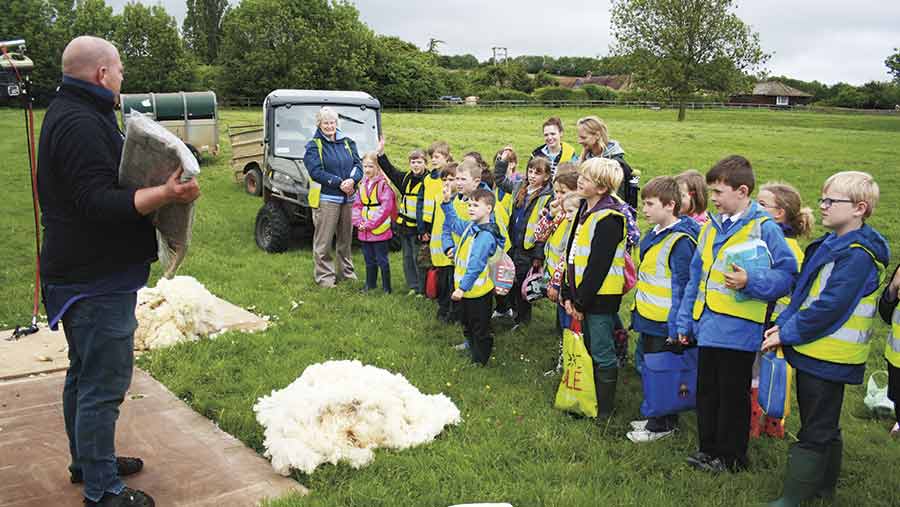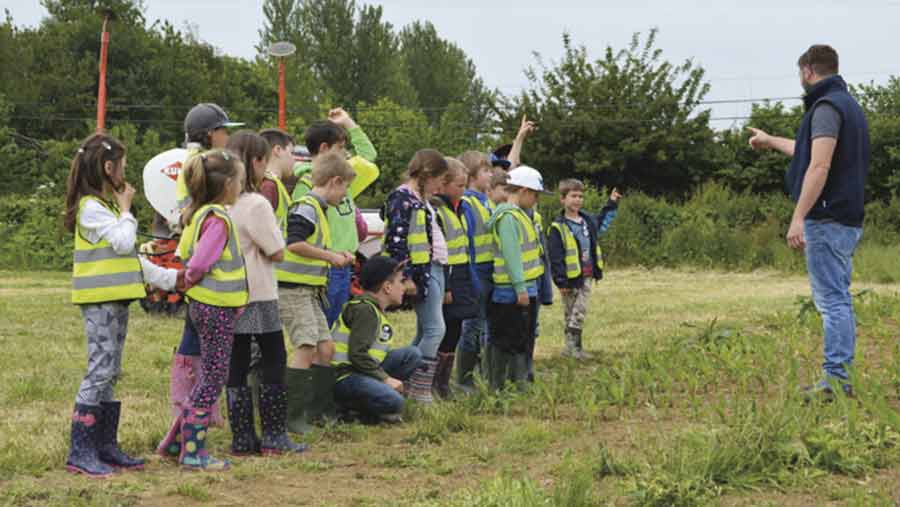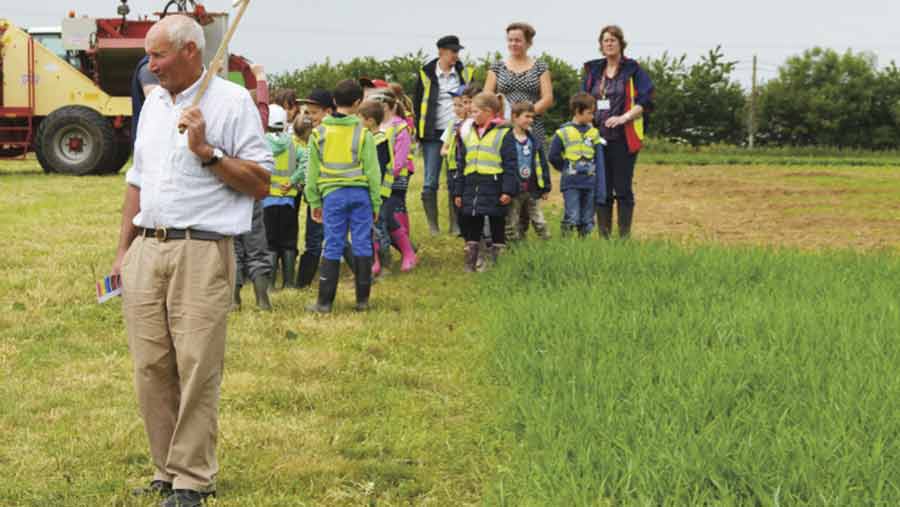Tips on hosting an on-farm school visit

A visit to a farm can be a life changing experience. As hundreds of farmers opened their gates on 5 June for Open Farm Sunday, many are also gearing up to welcome schoolchildren on to their farm for Open Farm School Days. Linking Environment and Farming explains what makes a successful on-farm school visit.
Understanding the need
The connection with food
For many children who live in urban environments who seldom, if ever, get the chance to visit the countryside, the open space, fresh air, sights, sounds and smells on a farm are a whole new world for them.
One in three children have never heard a cow moo – it’s a staggering statistic, which demonstrates the disconnect so many young people have with where their food comes from.
Getting children engaged with farming and food production enriches children’s experience of the natural world and creates a deeper understanding and respect for their food, which can lead to better and more informed food choices later in life. So, farmers have a huge role to play; positively promoting the industry and inspiring the next generation about the world of farming and how it affects their lives.
Supporting learning
Farms are a stimulating outdoor classroom which where children can learn about agriculture, but they can also provide the context for delivery of wider subject areas: from Science and Geography, through to Mathematics and History, while giving children the inspiration for Art and Literature.
Farms are a rich resource that can support a teacher’s work plans, helping them to deliver the curriculum by increasing children’s knowledge, developing understanding and reasoning, building confidence and a range of other life skills.
Sharing your story
Positive start
Welcome your visitors with a smile!
Introduce yourself and your team and give a brief overview of the visit and your farm, letting them know what’s happening on the farm that day. Set the ground rules and explain the behaviour you expect from them.
Emphasise that they are on a real working farm and talk about health and safety.
Make it relevant
Start with what children know and work back. Have a shopping basket with some everyday items – a loaf of bread, cereal packets, clothing or cosmetics – and discuss the link with your farm.
Engage all the senses
Have lots of hands-on activities that engage the children. They don’t need to be complicated – seed planting, digging up vegetables, nature trail, grinding flour or a pestle and mortar to extract oil from rapeseeds.
These are all great ways to help children remember their visit and your farming messages. Encourage children to look, listen, smell and touch things to keep them engaged.
Make it memorable
Use lots of props to help tell your story and techniques such as LEAF’s mini fields to talk about the inputs and outputs of a square metre of each field. Find the time to explore resources such as www.farmingismagic.co.uk which has a suite of useful videos and top tips with clever, colourful and memorable phrases, stories and activities to help you tell your farming story.
Keep it simple
Don’t overload children with information and avoid jargon wherever possible. Talk clearly and ask and invite questions to check that they have understood what you are saying.

Planning
Setting It up
Be clear about what you want to get out of a school visit and the stories you want to tell.
Get in touch with your local school as soon as possible – pick up the phone, email, write. Speak with teachers and tell them about your farm and what you have to offer.
It is always a good idea to organise a pre-visit for teachers, so that you can form a plan of action for the children’s visit and discuss how it can fit with their work programmes.
Logistics
Things to consider are:
- Adequate car parking space
- A secured covered area with seating
- A toilet and hand-washing facilities
- Signage so teachers and children know where to go
- Helpers on the day – ask friends, family and neighbours to lend a hand
- And a wet weather plan!
Health and safety is paramount
Carrying out a risk assessment is the first starting point to help you identify hazards. Consider how people might be harmed and put in place suitable control measures. Plan your route carefully and clearly mark-up areas not intended for the children to access.
If your visitors may come into close proximity with livestock, you and your helpers need to be familiar with and implement the Industry Code of Practice: ‘Preventing or controlling ill health from animal contact at visitor attractions’, which you can download from www.visitmyfarm.org. The summary document and guide for teachers clearly set out what is required. For hand-washing, the essentials include: clean running water, liquid soap and paper towels.

What to do next if you’re interested
LEAF (Linking Environment And Farming) is encouraging farmers who are hosting school visits in June to register these events as part of this nationwide Open Farm School Days initiative, which runs throughout June.
Register at www.farmsunday.org/schools and access all LEAF’s free resources, including our Host Farmer Handbook and activity ideas.
The benefits of hosting an Open Farm School Days Visit
- Sharing your expertise, experience and passion with the next generation is hugely rewarding
- Connecting with your community and consumers
- Showing the diversity of the farming and how farming affects everyone’s lives
- Seeing at first-hand children’s interest and enthusiasm and receiving positive feedback from schools
- Educating teachers and other adults about farming
- Diversifying your enterprise and potentially providing another income stream
- Raising the profile of your farm to the benefit of other enterprises such as a farm shop or camping area
- Providing children with unique experiences: holding a chick, walking a wheat field, climbing on a tractor
- Encouraging children to think about working in the countryside
Useful websites
For inspiration and resources to help you put on engaging and memorable on-farm school visits
An information hub for host farmers and teachers
www.countrysideclassroom.org.uk
Lots of fabulous resources for teachers about food, farming and the natural environment. Register your farm on the site database of “places to visit”.
Managed by the British Nutrition Foundation and supported by AHDB, the site hosts lots of great food and farming resources and activity ideas
Farming is Magic has a suite of useful videos and top tips with clever, colourful and memorable phrases, stories and activities to help you tell your farming story
Farming and Countryside Education (FACE) works with their members and partners to promote visits to farms
The Royal Highland Education Trust offers on farm visits all year round, free of charge to Scotland’s schoolchildren
Open Farm Schools Days are managed by LEAF with support from the following sponsors: Arla Foods, Asda, BASF plc, Defra, Farmers Weekly, Frontier Agriculture, John Deere, Jordans, LEAF Marque, Marks and Spencer, National Farmers Union, Sainsbury’s, Tesco, The Co-operative Food, Waitrose, plus the Agriculture and Horticulture Development Board.

